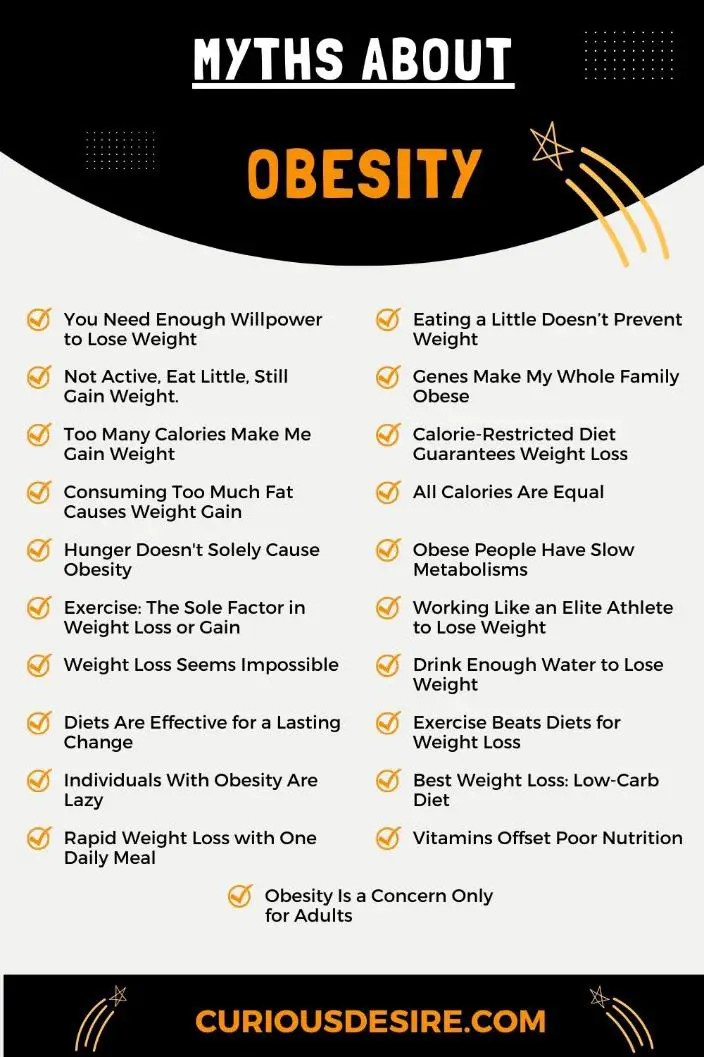When we talk about obesity, there are many ideas about being overweight that might not be quite right. These ideas, or myths, can make it hard for people to understand what it really means to manage weight.
In the discussion below, we want to clear up some common myths about obesity. By doing this, we hope to help people see the true picture of weight and health.
5 Most Common Myths Related to Obesity:
- Eating a Little Doesn’t Stop Me From Gaining Weight.
- I’m Not Active, so I Get Fat Even if I Eat a Small Amount.
- Everyone in My Family Is Obese Because of Our Genes.
- Too Many Calories Make Me Gain Weight.
- Calorie-Restricted Diet Guarantees Weight Loss
[ez-toc]

Myth 1: You Need Enough Willpower to Lose Weight
Myth 2: Eating a Little Doesn’t Stop Me From Gaining Weight
Why People Think This Way:
Many believe that limiting food intake is the primary solution for weight control. This misconception arises from a wrong understanding of calorie balance, neglecting the significance of nutrient density and overall dietary quality.
The Truth:
Weight management involves more than just quantity; it’s about the quality of the food consumed.
Focusing on nutrient-dense foods and balanced meals ensures the body receives essential vitamins and minerals, supporting overall health and sustainable weight loss.
Myth 3: I’m Not Active, so I Get Fat Even if I Eat a Small Amount
Why People Think This Way:
This belief exists due to a lack of understanding of the relationship between physical activity, caloric intake, and weight management.
They might just focus on the food part and forget that our bodies burn calories when we’re active. People might also think sitting around a lot means we don’t burn many calories, even if we don’t eat a ton of food.
Media portrayals and cultural narratives emphasizing the importance of exercise for weight control also contribute to the persistence of this perception.
The Truth:
Weight management is a balance between calories consumed and expended. While physical activity is very important for health, dietary choices also play a significant role.
Adopting a well-rounded approach that includes both a healthy diet and regular exercise is key for effective weight management.
Myth 4: Everyone in My Family Is Obese Because of Our Genes
Why People Think This Way:
Mostly obese folk have this perception that if someone in their family is carrying a little extra weight, it’s because of the family genes – like it’s in their DNA, and there’s nothing they can do about it.
They use it as a way to explain why they might be having a tough time with their weight, saying:
“It’s not my fault; it’s just how I’m made.”
But here’s the thing: it’s not only about genes; it’s also about the things we do in our routine. So, blaming it all on genes might not tell the whole story!
The Truth:
While your genes can make you more likely to be a certain way, family habits, and shared environments play a substantial role
Creating a supportive family environment that encourages healthy eating and regular physical activity can override genetic influences, promoting a healthier lifestyle for all.
Myth 5: Too Many Calories Make Me Gain Weight
Why People Think This Way:
Some people believe the myth that eating too many calories will automatically make you gain weight.
This idea comes from the basic concept that if your body doesn’t use all the extra calories, it turns into fat and makes you gain weight.
Likewise, media and weight loss narratives often focus on the simple equation of calories in versus calories out.
The Truth:
Not all calories are equal. The quality of calories, including their nutritional value, matters. Balancing calorie intake with a focus on nutrient-dense foods is required for maintaining a healthy weight and overall well-being.
Simply cutting calories without considering nutritional content may lead to imbalances and deficiencies.
Myth 6: Calorie-Restricted Diet Guarantees Weight Loss
Why People Think This Way:
There is this misconception that if you eat fewer calories than your body uses, you’ll lose weight because the body will start using stored fat for energy.
This idea becomes popular because it looks like a simple and easy solution to follow.
The Truth:
Losing weight in a healthy way is not just about eating less. It’s important to have a balanced diet with different kinds of foods and also do regular physical activities.
If you try to cut calories too much, it can make your body miss out on important nutrients, and it’s usually not something you can keep up with for a long time.
Myth 7: Consuming Too Much Fat Causes Weight Gain
Why Some People Think That:
The low-fat diet trends that gained popularity in the past, came from the perception that cutting out fat is the key to weight loss.
This idea became even more popular because companies selling food told everyone that products with no or very little fat were the healthier choice.
The Truth:
Myth 8: All Calories Are Equal
Why Some People Think That:
Certain individuals believe that all calories are equal because it makes diet advice sound simple.
It suggests that as long as you watch how many calories you eat, you can control your weight easily.
Also, it fits with the idea that losing weight is just about burning more calories than you eat.
The Truth:
Yes, calories matter, but what’s super important is the kind of calories you eat. Foods packed with vitamins and minerals are beneficial for your health.
However, just counting calories without thinking about what’s in your food can throw things off balance.
Myth 9: Obese Individuals Are Obese Because They Are Hungrier and Consume More Food
Why Some People Think That:
This misconception often arises from the assumption that individuals with excess weight lack discipline or self-control, leading to the stereotype that they must eat more due to increased hunger.
The Truth:
Obesity is influenced by a range of factors, including genetics, hormonal imbalances, and lifestyle. It’s not solely about hunger.
Understanding the complexity of obesity requires addressing various contributors, and adopting a holistic approach that considers both physical and emotional factors is essential for effective weight management.
Myth 10: Obese People Have Slow Metabolisms
Why Some People Think That:
Lots of people think this way because it sounds pretty simple – if you eat more than your body uses, you end up gaining weight.
When someone talks about having a slow metabolism, they mean their body doesn’t burn calories as quickly.
So, some folks believe this slow burn leads to putting on extra weight.
The Truth:
Our bodies are different, and some have slower metabolisms, but that doesn’t mean they’ll always gain weight.
What we eat and how physically active we are also play significant roles in maintaining our body’s health.
So, it’s not just about a slow or fast metabolism – it’s about eating good stuff and staying active!
Myth 11: Exercise Alone Leads to Weight Loss, and Lack of Exercise Causes Weight Gain
Why Some People Think That:
This myth is rooted in the idea that the calories burned through exercise directly determine weight loss, and conversely, the absence of exercise results in weight gain.
The Truth:
Weight management involves a combination of a healthy diet and regular physical activity. Relying solely on exercise without addressing dietary habits may not result in significant weight loss.
Therefore we can say that both aspects need attention for effective and sustainable outcomes.
Myth 12: Working Like an Elite Athlete to Lose Weight
Why Some People Think That:
The belief that working out like an elite athlete is necessary for weight loss exists due to:
- A desire for quick results
- Fitness industry messaging emphasizing extreme workouts
- A culture of comparison with elite athletes
- A lack of understanding of diverse and personalized exercise approaches
The Truth:
Extreme workouts are not required for effective weight loss. Consistent, moderate exercise according to individual capabilities is more sustainable and promotes long-term health.
Striking a balance between activity levels and a healthy diet is key for successful weight management.
Myth 13: It Is Not Possible for Me to Lose Weight I Want To
Why Some People Think That:
The perception that it is not possible to lose the desired amount of weight often exists due to:
- Past unsuccessful weight loss attempts
- Societal pressure regarding body standards
- The influence of media ideals
- The prevalence of quick-fix weight loss solutions
The Truth:
Getting to a healthy weight is totally possible with the right game plan and a positive attitude. Instead of trying to change everything at once, start by setting small goals and making little adjustments in how you live every day.
If you ever feel like you need help or support, don’t be afraid to ask your family, friends, or even professionals.
The trick is to find a way of doing things that you can stick with for a long time. Think of it like creating habits that make you feel good and that you can keep doing.
It’s not about quick fixes; it’s about making choices that work for you and keeping them up over time.
Myth 14: Drink Enough Water to Lose Weight
Why Some People Think That:
Most people think that drinking water before meals can help them feel full and eat fewer calories.
It’s like a quick and easy solution – just drink more water, and you’ll lose weight!
This idea gets a lot of attention from ads promoting different diets and wellness trends. They make it sound like water is the magic trick for losing weight super fast.
The Truth:
While staying hydrated is important for overall health, water alone is not a magical solution for weight loss.
It’s essential to combine proper hydration with a balanced diet and regular physical activity for effective weight management.
Myth 15: Diets Are Effective for a Lasting Change
Why Some People Think That:
This idea sticks around because lots of diet programs promise super quick and amazing results. They make it seem like if you follow their plan, you’ll lose weight forever.
They often show success stories from people who tried the diet, making it seem like these plans can bring big and lasting changes.
The Truth:
However, the reality is that quick fixes often don’t lead to lasting results.
True and lasting changes in our bodies usually require time, a balanced approach, and lifestyle adjustments rather than relying solely on restrictive diets.
Myth 16: Getting Active Is More Effective Than Relying on Diets for Weight Loss
Why Some People Think That:
The thought that being active is better than just depending on diets to lose weight makes sense for a few reasons.
First off, the emphasis on physical activity aligns with a broader understanding of overall health and wellness.
It also helps your heart, makes your body work better, and just makes you feel good overall.
The Truth:
Effective weight management necessitates a combination of a healthy diet and regular physical activity.
Just exercising by itself might not help you lose a lot of weight if you don’t also pay attention to what you eat.
To really manage your weight well, it’s important to think about both things – the exercise you do and the food you eat.
Myth 17: Individuals With Obesity Are Lazy
Why Some People Think That:
The misconception that individuals with obesity are lazy arises from societal biases and misconceptions surrounding weight.
Societal stigma plays a significant role, subjecting people with obesity to unfair judgments and negative stereotypes, with laziness being a commonly assigned trait.
The Truth:
Lots of things affect how much someone weighs – things like genes (what you inherit from your family), and the environment around you.
Calling someone with obesity lazy is not fair because it doesn’t look at all the things that can make someone gain weight. It’s like missing the bigger picture.
We should talk about being healthy in a way that helps everyone and looks at all the different things that can affect it.
This way, we can understand more and support each other without making anyone feel bad about themselves.
Myth 18: The Most Effective Method for Weight Loss Involves Following a Low-Carb Diet
Why Some People Think That:
The popularity and success stories linked to low-carb diets, such as ketogenic or Atkins diets, contribute to the perception that reducing carbohydrate intake is a surefire way to lose weight.
Media coverage often highlights dramatic initial weight loss results from these diets, reinforcing the idea that low-carb approaches are superior.
The Truth:
While low-carb diets can contribute to weight loss, the most effective approach involves a well-rounded diet that includes a balance of macronutrients.
Making your plan fit your own needs is the key to managing your weight in a way that lasts and feels enjoyable for you.
Myth 19: Losing Weight Rapidly Is Possible by Consuming Only One Full Meal per Day
Why Some People Think That:
One major cause behind the existence of this myth is intermittent fasting approaches, including the concept of eating only one meal a day (OMAD), which has gained popularity in weight loss discussions.
Success stories from people who say they lost a lot of weight by following strict diets can make it seem like extreme eating restrictions can give drastic results.
The Truth:
Extreme changes in what you eat might make you lose weight for a little while, but they usually don’t last, and they might not make you feel good overall.
It works better to make slow and balanced changes that fit what you like and what your body needs. This way, you can manage your weight over a long time and feel good inside and out.
Myth 20: Taking Vitamins Allows You to Consume Less Nutritious Foods Without Consequences
Why Some People Think That:
The supplement industry often promotes the idea that vitamins and minerals can compensate for deficiencies in one’s diet.
Sometimes, ads and marketing might make it seem like if you take supplements, you can eat whatever you want and still be healthy.
But thinking of vitamins as a safety net might come from not understanding exactly what they do. They can’t replace a healthy diet, and it’s still important to make good food choices.
The Truth:
While vitamins are essential for health, they cannot replace the nutritional benefits of whole foods. Relying solely on supplements without a balanced diet may lead to nutrient imbalances.
A varied and nutrient-dense diet is key for overall well-being.
Myth 21: Obesity Is a Concern Only for Adults
Why Some People Think That:
Some people think only grown-ups need to worry about being obese because that’s what we often hear in the news and see on TV.
They talk a lot about how it can make adults sick. So, it might seem like only adults can have a problem with being too heavy.
The Truth:
But the truth is – being too heavy can happen to people of all ages, not just adults. Taking care of it early on is super important for staying healthy in the long run.
The things we do, when we’re kids, can stick with us when we grow up, so it’s really important to start living healthy from a young age.
Understanding that being too heavy is something to pay attention to at every age helps us take action to stay healthy and feel good.
Obesity Myths FAQs
What are the 5 facts about obesity?
Obesity is a medical condition characterized by an excess of body fat, often assessed through Body Mass Index (BMI), where a BMI of 30 or higher indicates obesity.
The condition increases the risk of various health issues, such as heart disease, diabetes, and certain cancers. Contributing factors include poor diet, lack of physical activity, genetics, and environmental influences.
Globally, the prevalence of obesity has been steadily rising, posing a significant public health challenge.
What are the disturbing facts about obesity?
Obesity is associated with disturbing facts such as a higher risk of premature death and reduced life expectancy. Childhood obesity is a growing concern, leading to early health problems and potentially lifelong consequences.
It disproportionately affects lower-income populations, creating socioeconomic disparities in health. The economic burden of obesity is substantial, contributing significantly to healthcare costs.
Additionally, individuals with obesity often face stigma and discrimination, impacting their mental health.
What is true about obesity?
The truth about obesity is multifaceted; it is a complex condition influenced by genetic, environmental, and behavioral factors. Contrary to common misconceptions, it is not solely a result of overeating or lack of willpower.
Obesity is associated with a range of comorbidities affecting multiple organ systems, emphasizing its systemic impact.
Managing obesity effectively typically involves a comprehensive approach, including lifestyle changes and, in some cases, medical interventions.
Prevention and early intervention are crucial components in addressing the obesity epidemic.
What is the truth about obesity and health?
The truth about obesity and health is that it is a major risk factor for numerous chronic conditions, including cardiovascular diseases, type 2 diabetes, and musculoskeletal disorders.
Obesity leads to complications such as high blood pressure, insulin resistance, and sleep apnea. Inflammation associated with excess weight contributes to the development of chronic diseases.
Weight loss, achieved through a combination of healthy nutrition and regular exercise, can significantly improve health outcomes and reduce the risk of obesity-related illnesses.
Why is obesity so harmful?
Obesity is harmful due to its association with serious health conditions, including heart disease, stroke, and type 2 diabetes. It places strain on the body’s joints, contributing to musculoskeletal problems.
The inflammatory state associated with excess weight is linked to an increased risk of certain cancers.
Beyond physical health, obesity can impact mental health, leading to conditions such as depression and anxiety.
The overall impact underscores the urgency of addressing and preventing obesity on a global scale.
Can obese people lose weight?
Yes, obese individuals can lose weight by adopting healthier lifestyles, including balanced nutrition, regular physical activity, and sustainable habits.
Seeking guidance from healthcare professionals is essential for developing effective and personalized weight loss strategies.
Can obesity be cured?
While there is no outright cure for obesity, it can be effectively managed through long-term lifestyle changes. Sustainable weight management involves maintaining a healthy diet, regular exercise, and addressing underlying factors contributing to obesity.
Can obese people get in shape?
Absolutely, obese individuals can improve their fitness and overall health by incorporating regular physical activity into their routine. Gradual, sustainable changes in diet and exercise contribute to getting in shape and promoting overall well-being.
Do heavier people lose weight faster?
Initially, individuals with higher body weight may experience more rapid weight loss, but the rate tends to slow as they approach a healthier weight. Weight loss rates vary among individuals based on factors such as metabolism and adherence to lifestyle changes.
Can a person be obese and healthy?
Yes, while some individuals classified as obese may exhibit relatively good metabolic health, the overall risk of developing obesity-related diseases is higher.
The term “metabolically healthy obesity” is used to describe those with obesity who show fewer metabolic disturbances. However, long-term health outcomes can still be affected.
How is obesity a warning for good health?
Obesity serves as a warning sign for potential health issues, urging individuals to adopt healthier lifestyles to mitigate associated risks. Recognizing obesity as a health indicator allows for early intervention and prevention of obesity-related complications.
Is obesity a great problem?
Yes, obesity is a significant global health problem with widespread implications for individual well-being and public health. The increasing prevalence of obesity poses challenges for healthcare systems, economies, and overall population health.
Why is obesity scary?
Obesity is concerning due to its association with numerous health problems, reduced quality of life, and the strain it places on healthcare systems. The potential for serious complications, both physical and mental, underscores the urgency of addressing obesity as a public health priority.
Can obesity be cured?
While there is no outright cure for obesity, it can be effectively managed through sustained lifestyle changes, promoting overall health and reducing the associated health risks. Consistent efforts toward maintaining a healthy weight and lifestyle are key components of successful obesity management.



